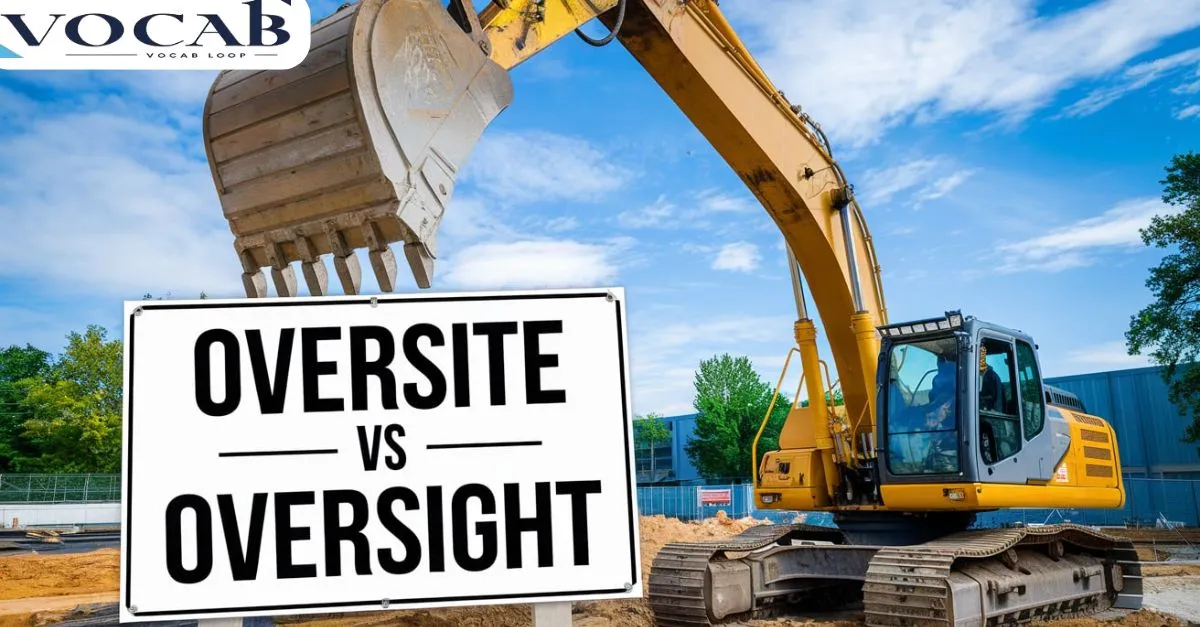Language can be tricky, especially when words look similar but have distinct meanings. Oversite vs oversight are prime examples. While they may appear alike, their uses and contexts differ significantly. Oversite is a technical term primarily used in construction, referring to a foundation layer that supports a building.
It’s mostly recognized in British English and is rarely used in American English, where more specific terms like “foundation base” are preferred. On the other hand, oversight has a broader application, referring to supervision, governance, or an unintentional mistake. Understanding the difference between these terms is crucial for improving writing accuracy and avoiding common mistakes.
What is the confusion oversite vs oversight?

Many people confuse oversite and oversight because they are almost identical in spelling. The problem lies in their rare usage together and their distinct meanings. Oversite is specific to construction and technical fields, while oversight relates to management, errors, and supervision.
The confusion also stems from a lack of exposure. Oversite is uncommon and mostly limited to British English. In contrast, oversight is widely used in everyday language, especially in workplaces, governance, and leadership roles.
What is oversite?
Oversite is a technical term used primarily in construction and architecture. It refers to a prepared layer, often made of concrete, that is placed beneath a building’s foundation to provide stability and prevent moisture from seeping in.
The oversite ensures a solid base for the structure, making it a critical element in construction. This term is more commonly used in British English and is not widely recognized in American English, where terms like “foundation base” or “subgrade layer” are typically used instead.
Is the oversite word correct?
Yes, oversite is a correct term, but it is far less common than oversight. It is used in technical fields, particularly in construction, to describe a concrete base or protective layer.
Definition:
Oversite refers to the concrete or structural foundation laid beneath floors, offering a protective layer.
Meaning:
This term is primarily used in construction to ensure stability and quality. It prevents moisture, acts as a safeguard, and provides a flat surface for additional layers like tiles or carpet.
Usage:
For example, in construction manuals, you might read, “The oversite concrete was poured to create a durable base for the building.”
What is oversight?
Oversight refers to the act of supervising or managing something to ensure it is done correctly. It can also describe an unintentional mistake or failure to notice something important. In professional contexts, oversight is often associated with accountability, governance, and quality assurance, ensuring tasks, processes, or regulations are properly followed.
For example, in a business setting, oversight might involve a manager reviewing employees’ work to ensure compliance with company standards. The term is widely used in both American and British English and applies across various fields, from leadership to regulatory bodies.
Is the oversight word correct?

Absolutely, oversight is a widely accepted and frequently used word. It refers to supervisory responsibilities or unintentional mistakes.
Definition:
Oversight means the act of overseeing tasks, managing projects, or referring to an unintentional error.
Meaning:
Oversight plays a critical role in ensuring tasks are completed accurately. It can also describe an error caused by neglect or inattention. For instance, “The committee provided oversight for the project” or “The delay was caused by an oversight in planning.”
Usage:
You’ll often find oversight in fields like governance, leadership, and project management, where supervision and accountability are key.
Quick summary
| Aspect | Oversite | Oversight |
| Definition | A technical term in construction referring to a prepared foundation layer. | Refers to supervision, governance, or an unintentional mistake. |
| Context | Used in construction and architecture. | Common in management, accountability, and general use. |
| Geographical Usage | More common in British English. Rare in American English. | Widely used in both American and British English. |
| Example Sentence | “The oversite must be level before construction begins.” | “The project failed due to poor oversight.” |
| Recognition | Limited outside technical fields. | Broadly recognized and versatile. |
| Memory Tip | Think of site for construction. | Think of sight for watching over or missing something. |
Oversite vs Oversight as parts of speech
Both words are nouns. their roles differ in language use. Oversite functions in specific contexts related to technical fields, while oversight fits into supervisory roles and error reporting.
| Aspect | Oversite | Oversight |
| Definition | A concrete base | Supervision or an error |
| Usage | Construction-related | Management, governance, accountability |
| Context | Technical or structural | Everyday, professional, or leadership |
Pronunciation of oversite vs oversight
Oversite is pronounced as /ˈəʊ.və.saɪt/, while oversight is pronounced as /ˈoʊ.vɚ.saɪt/. In American English, there’s a slight emphasis on the “r” in oversight, making it distinct from oversite.
Side-by-Side Comparison oversite vs oversight
| Feature | Oversite | Oversight |
| Usage | Technical fields | Supervisory or general |
| Meaning | Foundation/base | Supervision or an error |
| Frequency | Rare | Common |
Which one is more acceptable oversite vs oversight

In general usage, oversight is more widely accepted due to its broad applications in supervision, accountability, and error contexts. In contrast, oversite is highly specific to construction and architectural discussions, making it far less recognized, particularly in the USA.
This limited usage confines oversite to technical contexts, whereas oversight is versatile and common in professional and everyday language.
Oversite in British English and American English
In British English, oversite is commonly used in construction and architecture to refer to a prepared layer beneath foundations.
In American English, the term is rarely used and is often replaced by more specific technical phrases like “foundation base” or “subgrade layer,” reflecting regional differences in terminology.
Oversight in British English and American English
Oversight holds the same meaning in both American and British English, referring to supervision or an unintended error. However, it tends to appear more often in American professional contexts, where it emphasizes management, accountability, and regulatory compliance.
This frequent usage highlights its importance in leadership, corporate governance, and quality assurance discussions.
Common mistakes how to avoid from them
A common mistake people make is using oversite when they mean oversight. Proofreading errors often happen because the words look similar. To avoid this, focus on the context: is it about a foundation (oversite) or a mistake/supervision (oversight)? By paying attention to the surrounding details, you can easily distinguish between the two and use the correct term.
Trick to Remember the Difference oversite vs oversight
A simple way to remember the difference is this: if the context is construction, think of a site in oversite to relate it to a physical location or foundation work. For anything related to management, supervision, accountability, or errors, use oversight.
The connection between “sight” and watching over something can help you associate oversight with supervision and its occasional meaning of an unintentional mistake. This quick trick ensures accurate usage in everyday writing.
Origins of oversite vs oversight

Oversite
The term oversite originates from Old English, where “ofer” meant “over,” and “site” referred to a location or position. It traditionally described something over a specific site or area, evolving over time to denote the preparatory layer in construction that supports foundations.
This technical use remains its primary meaning today, emphasizing its importance in structural stability.
Oversight
Oversight derives from Middle English, combining “over,” meaning above or beyond, and “sight,” referring to vision or observation. Initially, it referred to the act of supervising or monitoring. Over time, it also gained a secondary meaning: an inadvertent error or something overlooked.
The dual meanings—careful supervision and unintentional omission—make it a versatile term widely used in leadership, project management, and accountability contexts.
Synonyms of oversite vs oversight
oversite:
- Foundation
- Base
- Underlay
- Subfloor
- Groundwork
- Concrete slab
- Support layer
- Structural base
- Floorbed
- Substrate
oversight:
- Supervision
- Lapse
- Neglect
- Error
- Monitoring
- Guidance
- Inspection
- Management
- Misstep
- Responsibility
Sentences in daily usage of oversite vs oversight

Oversite
- The builder checked the oversite for cracks.
- Oversite concrete is vital for stability.
- You must properly prepare the oversite before laying the foundation.
- Heavy rains delayed the curing of the oversite layer.
- Engineers inspected the oversite to ensure it met safety standards.
- An uneven oversite can compromise the structure’s integrity.
- The oversite serves as a base for all further construction work.
- Contractors poured the oversite concrete in sections to avoid cracks.
- Proper drainage around the oversite prevents water damage.
- Without a solid oversite, the foundation might settle unevenly.
Oversight
- The delay was caused by an oversight.
- Effective oversight ensures quality assurance.
- The project failed due to a lack of oversight.
- His oversight led to a critical error in the report.
- Good oversight prevents costly mistakes.
- Oversight committees monitor compliance with regulations.
- A minor oversight in the budget caused a significant shortfall.
- The company’s strong oversight practices ensure transparency.
- Her oversight as team leader has improved efficiency.
- The new policy was implemented under close oversight.
FAQs
Why Do People Confuse Oversite and Oversight?
The words look and sound similar, but they have different meanings. Oversight refers to supervision or a mistake, while oversite is a technical term used in construction.
Is Oversite a Legitimate Word in American English?
Yes, but it’s uncommon and primarily used in construction to describe a layer that supports foundations.
How Is Oversight Used in Leadership?
In leadership, oversight means supervising tasks, ensuring accountability, and guiding teams to meet goals.
What Are Common Uses of Oversight?
Supervision of projects or processes. Committees ensuring compliance. Referring to mistakes or omissions.
How Can You Prevent Errors in Term Usage?
Learn each term’s meaning and context. Use spellcheck tools. Review your writing carefully.Consult reliable dictionaries when unsure.
Conclusion
Oversite and Oversight is vital for clear communication. While oversite refers to a specific construction term, oversight plays a broader role in supervision and error management.
By knowing their distinctions, you can ensure writing professionalism, avoid common typos, and enhance clarity in writing.

Alex Hormozi is a seasoned blogger at Vocab Loop, known for his deep insights into language, vocabulary, and grammar. With years of experience in writing, Alex shares practical tips and effective strategies to help readers improve their linguistic skills and enhance their writing abilities.

